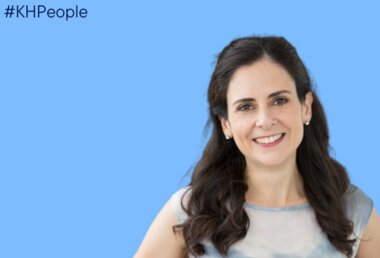29 November 2023
Dr Cristina Dias embodies partnership working - she works across multiple organisations, building on what we know about rare diseases to help find answers for the patients she works with.
What is your role in King’s Health Partners?
I am Clinical Senior Lecturer at King’s College London; a Consultant in clinical genetics at Guy’s and St Thomas NHS Foundation Trust; I am a visiting scientist at the Francis Crick Institute and an Honorary Consultant at Great Ormond Street Hospital where I lead a rare disease clinical study on a group of neurodevelopmental disorders. My day to day involves doing research in chromatin disorders, a specific type of rare diseases. I work with my team in the lab where we use cells in a dish to model and understand the developing brain for patients with rare diseases. I also spend time in the clinical genetics departments at Guy’s Hospital where we assess and diagnose patients and families with rare disease.
How do you define rare disease?
A rare disease is defined as a condition which affects less than 1 in 2,000 people. While individually rare, collectively these conditions have a significant impact, affecting around 3.5 million people in the UK at any given time. Over two-thirds of rare diseases affect individuals from childhood, and a similar number are known or thought to be genetic in origin. They frequently affect multiple organs and systems, and most patients will have been seen by multiple doctors and care teams over the course of several years before receiving a diagnosis. Importantly, these diseases often present unique challenges due to their limited understanding, both in terms of their underlying mechanisms and available treatment options.
Can you tell us about the KHP Rare Disease Network?
The ambition for the King's Health Partners (KHP) Rare Disease Network is rooted in the UK Rare Disease Framework published by the government in January 2021, which has set out an ambitious plan to deliver better health outcomes and improve the lives of those living with rare diseases. The KHP Rare Disease Network aims to address the complex challenges associated with rare diseases by fostering collaboration among clinicians, researchers, and other stakeholders, including industry and patient organisations. The specific objectives include: raising awareness of existing research across KHP institutions through engagement events; enhancing collaboration, scale, and impact of research; providing a vehicle to attract future public and private investment in translational rare disease research.
King’s Health Partners is uniquely placed for this endeavour, bringing together some of the largest clinical and research institutions in the country. It benefits from a strong foundation of medical knowledge, clinical experience, and cutting-edge research capabilities. This is particularly valuable in the complex landscape of rare diseases, where insights from various disciplines are essential for understanding and addressing these conditions.
What has inspired you to pursue your work in this area?
As a Clinical Geneticist and Clinician Scientist in rare disease I sit at the interface between the patient and the research lab. My motivation stems from the profound impact that advancements in medical genetics and genomics can have on individuals with rare diseases. Witnessing the transformative power of identifying novel disease-gene associations and unravelling the mysteries of rare paediatric neurologic and neurodevelopmental disorders has been a driving force, as it has the potential to make a tangible difference in the lives of patients and families.
In addition to motivating my clinical and basic science research, my experience has highlighted the value of creating a cohesive environment where clinicians and scientists collaborate, share expertise and work towards common goals of improving outcomes for individuals with rare diseases.
What are the benefits of working in partnership?
Collaboration is essential in the field of rare diseases. Working in partnership brings together diverse expertise, resources, and perspectives, accelerating the pace of discovery and innovation. The collaborations developed through the Rare Disease Network will ultimately lead to faster progress in understanding the disease, development of new treatments, and improved patient outcomes. It will be an accelerator of translation of research into clinical practice.
In addition to direct benefit to patients and families, we foresee additional benefits that address pertinent contemporary challenges.
Financial resource responsibility and environmental sustainability are fostered by collaborative partnerships, allowing for the sharing of knowledge, resources, and expertise, ensuring that resources are used more efficiently. Engaging patient and industry stakeholders will also safeguard investment in the issues that matter most to patients and their families, bringing potential treatments and interventions to the public more rapidly and effectively.
What do you enjoy most about your role?
As a clinician scientist, one of the most fulfilling aspects of my role is the opportunity to integrate my patient-facing clinical practice with cutting-edge research. Working directly with patients who often have genetic conditions causing neurodevelopmental delay, I understand that for most families with rare diseases, there are more questions than answers.
It is rewarding to see how the interplay between clinical insights and research holds the promise to make meaningful strides in understanding and treating rare diseases in the future. Moreover, contributing to the training and mentorship of scientists and clinicians adds a rewarding dimension to my role, striving to have a positive impact on the future of scientific and clinical work related to rare diseases.
The King's Health Partners Rare Disease Network aims to bring together research and clinical groups across the partners. Planned activities include Rare Disease Rounds showcasing basic, translational and clinical research in rare disease – open to academic and industry partners and an annual networking event. If you are involved or interested in rare disease research, and would like to hear updates about the network, share feedback or express an interest, please complete this survey before Friday 8 December. Click here to access the survey.





